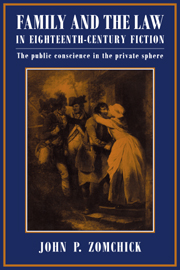Book contents
- Frontmatter
- Contents
- Preface
- Acknowledgments
- 1 Introduction
- 2 Roxana's contractual affiliations
- 3 Clarissa Harlowe: caught in the contract
- 4 Tame spirits, brave fellows, and the web of law: Robert Lovelace's legalistic conscience
- 5 Roderick Random: suited by the law
- 6 Shadows of the prison house or shade of the family tree: Amelia's public and private worlds
- 7 The embattled middle: longing for authority in The Vicar of Wakefield
- 8 Caleb Williams: negating the romance of the public conscience
- Bibliography
- Index
4 - Tame spirits, brave fellows, and the web of law: Robert Lovelace's legalistic conscience
Published online by Cambridge University Press: 10 February 2010
- Frontmatter
- Contents
- Preface
- Acknowledgments
- 1 Introduction
- 2 Roxana's contractual affiliations
- 3 Clarissa Harlowe: caught in the contract
- 4 Tame spirits, brave fellows, and the web of law: Robert Lovelace's legalistic conscience
- 5 Roderick Random: suited by the law
- 6 Shadows of the prison house or shade of the family tree: Amelia's public and private worlds
- 7 The embattled middle: longing for authority in The Vicar of Wakefield
- 8 Caleb Williams: negating the romance of the public conscience
- Bibliography
- Index
Summary
[T]he novelistic hybrid is not only double-voiced and double-accented (as in rhetoric) but it is also double-languaged; in it there are not only (and not even so much) two individual consciousnesses, two voices, two accents, as there are two socio-linguistic consciousnesses, two epochs, that, true, are not here unconsciously mixed (as in an organic hybrid), but that come together and consciously fight it out on the territory of the utterance.
M. M. Bakhtin, The Dialogic Imagination, p. 360In the previous chapter I examined the forces that make Clarissa become an unwilling juridical subject. Because of her strong allegiance to patriarchal tradition, however, she remains a divided subject, a hybrid of juridical and patriarchal values, just as the family is a hybrid of absolutist tactics and liberal principles. In the following chapter I intend to show that Robert Lovelace is yet another hybrid character. Like Roxana and Clarissa, Lovelace bears a divided allegiance. The division in him, however, a privileged male in a hierarchical society, is not the consequence of a choice between alienation and juridical empowerment. Rather, Lovelace's character is the site of the deliquescence of aristocratic ideals and the emergence of an anarchic version of individualism. Thus, critics have allied Lovelace with both an heroic past and a transcendent future. Other recent critics of Richardson's novel have also noted Lovelace's familiarity with and reliance on the law. Rita Goldberg sees him sharing the legally sanctioned power enjoyed by other males in the text. Linda Kauffman finds evidence of a legalistic mentality in Lovelace's reliance on contracts to provide for the women he has ruined.
- Type
- Chapter
- Information
- Family and the Law in Eighteenth-Century FictionThe Public Conscience in the Private Sphere, pp. 81 - 104Publisher: Cambridge University PressPrint publication year: 1993

